Holden Commodore (VR)
The Holden Commodore (VR) is an executive car which was produced by the Australian manufacturer Holden from 1993 to 1995. It was the third iteration of the second generation of the Australian built Holden Commodore. The VR range included the luxury variants, Holden Commodore Berlina (VR) and Holden Calais (VR) and a commercial model, the Holden Ute (VR).
| Holden Commodore (VR) | |
|---|---|
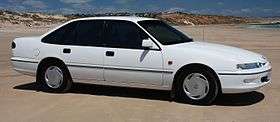 Holden Commodore Acclaim sedan | |
| Overview | |
| Manufacturer | Holden (General Motors) |
| Also called | Holden Calais Holden Ute[1] Opel Calais Toyota Lexcen (T3) |
| Production | July 1993 – April 1995 |
| Assembly | Australia: Elizabeth, South Australia |
| Body and chassis | |
| Class | Executive |
| Body style | 2-door coupe utility[1] 4-door sedan 5-door station wagon |
| Platform | FR layout GM V |
| Related | Holden Statesman/Caprice (VR) HSV VR CSV 220i Opel Omega A |
| Powertrain | |
| Engine | 2.6 L Dual Ram Inline 6 (Export Only) 5.0 L HEC 5000i V8 |
| Transmission | Manual
|
| Chronology | |
| Predecessor | Holden Commodore (VP) |
| Successor | Holden Commodore (VS) |
Overview
Launched in July 1993 and sold until April 1995,[3] the VR series came with an updated, sleeker and more modern design, as well as safety enhancements such as anti-lock brakes (ABS). From the side, the biggest change was the revised daylight opening around the C-pillar and the use of a round rear wheelarch, instead of a squared-off shape used on the previous VN and VP model Commodores. The VR Acclaim and Calais included a driver's side Supplemental Restraint System (SRS)[4] airbag as standard, which was a first for an Australian car. They also had standard ABS brakes and independent rear suspension (IRS). The airbag, ABS brakes and IRS were also available across the range for both automatic transmission and manual transmission models. The rear-end treatment saw raised tail lamps, which were recessed high up on the boot lid for safety reasons. A new electronic version of the Turbo-Hydramatic 700R4 (TH700) automatic transmission was introduced, known as the GM 4L60-E. The VR Commodore was Wheels Car of the Year for 1993.
Models
Commodore Executive
Commodore Executive opened up the VR lineup, although it was primarily projected at fleet customers. Power steering, electric side mirrors and four-wheel disc brakes were standard, with automatic transmission optional.
Only one limited edition model was offered in the VR range:
- Commodore Equipe: introduced in 1995, a Series II model in either sedan or wagon bodies was based on the Executive.
Commodore Acclaim
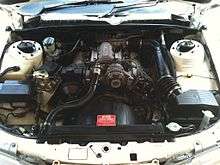
With the introduction of the VR Commodore, Holden added the Acclaim model to the Commodore range. Sitting one notch above the Executive, the Acclaim was based on an automatic transmission Executive with a safety pack that was aimed at families and featured ABS brakes, IRS, driver's side airbag and cruise control as standard.
Although the Acclaim came standard with automatic transmission, a buyer could, by taking an Executive with manual transmission, and adding the ABS brakes, IRS, and airbag options, have a Commodore that was almost a manual transmission Acclaim. Only cruise control was not available as an option.
Commodore S
The Commodore S was a sports option based on the Executive, retaining its 3.8-litre engine.
Commodore SS
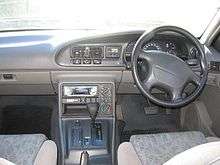
SS models were similar to the S, except that they were fitted with Holden's 5.0-litre HEC 5000i V8. A unique-to-SS alloy wheel design was also featured. A 185 kW (252 PS; 248 hp) engine was offered as an option.
Commodore Berlina
The Commodore Berlina [5] was the first of the luxury-oriented variants. Alloy wheels, electric windows and automatic transmission were standard fitment. Sedan and wagon variants were offered.[5]
Calais
The Calais topped the VR lineup with an automatic transmission, driver's airbag, IRS, and ABS as standard, as well as features, such as climate control and velour trim or optional leather, to differentiate it from the lesser Commodore models.
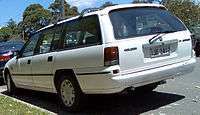 Commodore Executive wagon (Series II)
Commodore Executive wagon (Series II)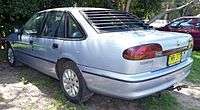 Commodore Equipe sedan (Series II, limited edition)
Commodore Equipe sedan (Series II, limited edition)_01.jpg) Commodore SS
Commodore SS_sedan_(2008-10-09).jpg) Holden Commodore Berlina sedan (VR)
Holden Commodore Berlina sedan (VR)_02.jpg) Holden Calais
Holden Calais
Holden Ute
A coupe utility variant of the VR Commodore was offered in Holden Ute and the Holden 'S’ Ute models.[1] Unlike the Ute which carried no external model badging, the 'S’ Ute was fitted with "Commodore" badges.[1]
_S_utility_(2011-11-08).jpg) Holden Ute S (Series II)
Holden Ute S (Series II)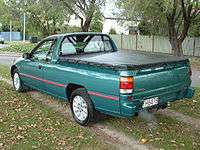 Holden Ute S
Holden Ute S
Holden Statesman and Caprice (VR)
Holden also produced longer wheelbase variants of the Commodore VR as the Holden Statesman (VR) and the Holden Caprice (VR).
_sedan_(2011-11-18)_01.jpg)
HSV range
Holden's performance vehicle partner Holden Special Vehicles produced the following range of Holden VR based models, which were each marketed under the HSV brand.
Clubsport
The VR series Clubsport, which was based on the Holden Commodore (VR), was released in August 1993.[6] It was powered by a 185 kW 5.0-litre V8 engine.[6] 1,117 sedans and 77 wagons were produced.[6]
_sedan_01.jpg) HSV Clubsport sedan
HSV Clubsport sedan_sedan_02.jpg) HSV Clubsport sedan
HSV Clubsport sedan
GTS
The GTS came with a six-speed manual or optional four-speed automatic. Its V8 engine produced 215 kW (288 hp) and 475 N⋅m (350 lb⋅ft). 277 were produced.
Maloo
The VR series Maloo utility was introduced in August 1993 with new front sheetmetal and a reworked interior appearance. The 5.0-litre V8 engine was upgraded slightly to 185 kW (248 hp). 156 examples were produced.[7]
Senator
In 1993, the significantly redesigned VR Senator was released. The rear seating was from the Holden Statesman. Along with the rest of the HSV range, the Senator bodykit was penned by designer Ian Callum to produce a sleeker, more aggressive stance along with a 185 kW (248 hp) version of the 5.0-litre V8. A new suspension setup was developed, known as the touring package which aimed to provide capable handling and a smooth ride. Additionally from May 1994 onwards, the Senator could be optioned with HSV's new 215 kW (288 hp) 5.7-litre "stroker" V8 known as the "215i". The $10,000 "stroker" engine option was handbuilt as an upgrade over the standard V8. This engine could be coupled to either the four-speed automatic transmission or a six-speed manual transmission.[8] 0–100 km/h (0-60 mph) takes 7.8 sec for the 185i and takes 7.3 sec for the 215i. Total number built for both versions was 855.[9]
Toyota Lexcen (T3)
_CSi_station_wagon_03.jpg)
_Newport_sedan_(2010-12-28).jpg)
_CSi_sedan_02.jpg)
The United Australian Automobile Industries (UAAI) joint venture agreement with Toyota Australia first starting with the VN Commodore continued with the VP and VR. The VR Lexcen equivalent was known as the T3 series, and was introduced at or about the same time as the other VR models; featuring subtle styling differences, particularly, the front panels. While the VR badged as a Holden was either first or second in the monthly Australian automotive sales, the Toyota Lexcen sold substantially fewer, as there was an interpretation of the Toyota Lexcen as Japan returning to its copycat roots. This was due to Toyota specifying styling that was in common with the then new "wide body" Camry, while retaining the original Commodore bodywork and interiors. Lexcen sales were still quite low, also another factor in this is Holden restricted Toyota in the number of Lexcens it was to provide to them. The number of technical service bulletins, recalls and customer service exercises on Holden-supplied Lexcens exceeds typical Toyota exercises on Toyota built vehicles in the era by more than five to one.
| Wikimedia Commons has media related to Holden Commodore (VR). |
References
- The Legendary V6 And V8 Holden Utes, 12-page brochure AD10510 of July 1993 covering the VR Series Holden Ute and Holden 'S’ Ute
- Holden Owner's Handbook VR series, General Motors - Holden's Automotive Ltd, 1993, page 8-2
- "Review: Holden VR Commodore (1993–95)". AustralianCar.Reviews. Retrieved 19 July 2016.
- Holden Owner's Handbook VR Series, General Motors - Holden's Automotive Ltd, 1993, page 6-5
- The Berlina is referred to as the "Holden Commodore Berlina" in the sales brochure "The New Holden Commodore. Executive, Acclaim, Berlina, S and SS.", AD10508, General Motors- Holden's Automotive Limited, August 1993
- Review:HSV VR ClubSport (1193-95), australiancar.reviews Retrieved 24 May 2016
- "20th Anniversary Maloo R8 Brochure". HSV.com.au. Archived from the original on 15 December 2010. Retrieved 11 April 2011.
- "The arrival of the VR". Archived from the original on 21 April 2008. Retrieved 25 January 2007.
- "(1993-1995) HSV VR". Archived from the original on 29 August 2007. Retrieved 8 March 2007.